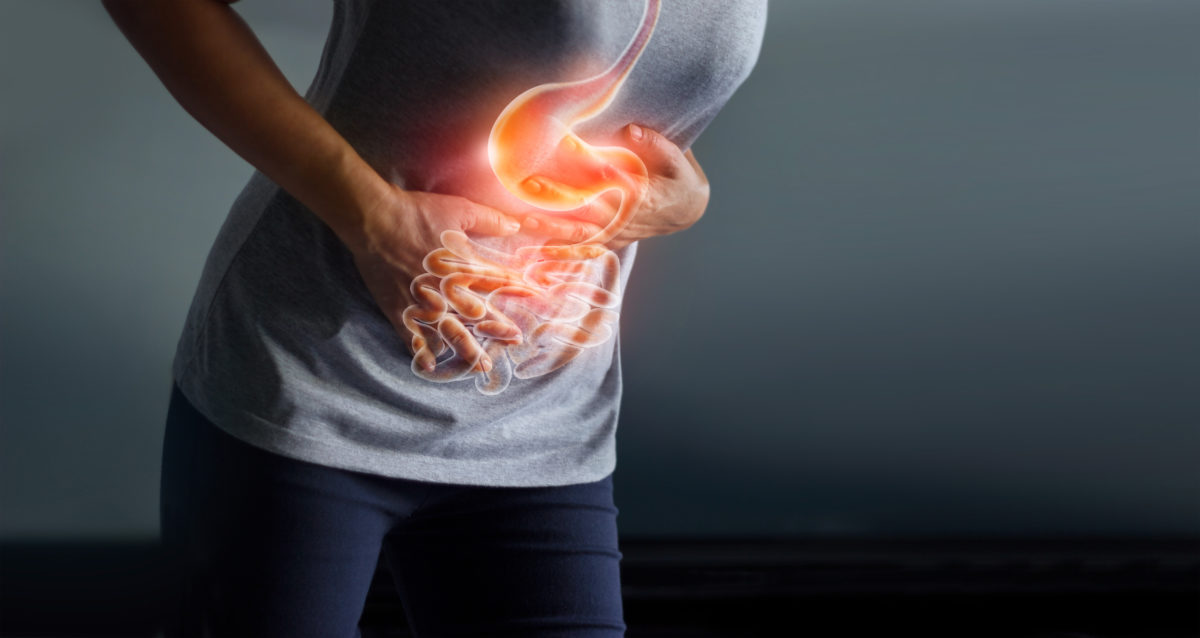
There’s a secret weight loss enemy lurking within your body that you might not even be aware of….
Stress can cause it. So can environmental toxins. Eating a poor diet also leads to it. It’s called chronic inflammation, and it’s rampant, especially in the United States.
Reducing inflammation is not only essential to your well-being, but also a good first step to long-term weight loss.
What is inflammation?
Think of inflammation like a fire that your body is trying to put out. It’s a defense mechanism that goes off when your body is trying to protect itself.
Inflammation can be beneficial in many cases, such as when you sustain an injury and inflammation senses the tissues need care and protection. This type of inflammation is known as acute, or short-term.
However, inflammation can cause more harm than good when your body is under constant attack, known as chronic inflammation. Chronic inflammation happens internally and over a longer period. It’s a response to a larger problem within the body. In addition to weight gain, chronic inflammation has been linked to almost every major disease, including cancer, heart disease, and type 2 diabetes.
What are the common causes for chronic inflammation?

Common causes for chronic inflammation.
Chronic inflammation can be caused by any one of several factors or a combination of factors such as:
- Eating too much sugar and/or processed foods laden with chemicals and pesticides
- Environmental toxins and impure drinking water
- Infections and injuries that are left untreated
- Chronic stress
- Autoimmune disorders like lupus, arthritis, and type 1 diabetes.
- Long-term exposure to polluted air, industrial chemicals, and other irritants
- Excess weight, smoking, alcohol, and nutritional deficiencies are all found to contribute to chronic inflammation.
What’s the connection between inflammation and weight?
 When inflammation is present, losing weight can be extremely difficult, even with the most disciplined eating and exercise habits. That is because your body is so busy “putting out the fire,” that its priority is not on weight loss, but on healing and survival. What’s worse, excess weight can also contribute to additional inflammation, creating a vicious cycle.
When inflammation is present, losing weight can be extremely difficult, even with the most disciplined eating and exercise habits. That is because your body is so busy “putting out the fire,” that its priority is not on weight loss, but on healing and survival. What’s worse, excess weight can also contribute to additional inflammation, creating a vicious cycle.
Excess weight itself can be a significant contributor to chronic inflammation in the body. Adipose tissue, or fat cells, produce pro-inflammatory substances called adipokines. When someone is overweight or obese, their adipose tissue increases in volume, resulting in higher levels of adipokines being released into the bloodstream. These pro-inflammatory substances can trigger and sustain chronic inflammation throughout the body.
Moreover, excess weight can lead to a state of low-grade inflammation known as meta-inflammation. Meta-inflammation occurs when fat cells accumulate in non-adipose tissues, such as the liver, pancreas, and muscles. This infiltration of fat cells into non-adipose tissues can disrupt their normal functioning and trigger an inflammatory response.
Inflammation also contributes to a condition called insulin resistance. This is due to inflammatory compounds that impair the way insulin works. When insulin isn’t doing its job, it’s nearly impossible to reduce the associated symptoms including; weight gain, difficulty losing weight, low energy levels, brain fog, food cravings, sleep issues, and more.
Chronic stress (a major inflammation contributor) increases the body’s levels of cortisol (the stress hormone), which has been linked to higher amounts of belly fat. Vitamin deficiencies such as vitamin B6, vitamin B12, and vitamin D are also linked to inflammation and weight gain.
Inflammation and leaky gut
If you’re dealing with chronic inflammation, more than likely you are also dealing with gut health issues. Leaky gut syndrome is one such problem. In fact, joint pain, headaches, lack of energy, thyroid issues, bloating, weight gain, and food allergies and sensitivities are all common symptoms of leaky gut. Chronic inflammation can disrupt the delicate balance of the gut microbiota, the community of microorganisms living in our intestines. When this balance is disturbed, harmful bacteria can grow, leading to an overgrowth of pathogenic microorganisms. This can trigger an inflammatory response in the gut, which can then spread throughout the body. In leaky gut, the tight junctions between the cells lining the intestinal wall become permeable, allowing toxins, undigested food particles, and bacteria to leak into the bloodstream, triggering an immune response and further inflammation. Addressing gut health and promoting a balanced gut microbiota can help reduce chronic inflammation and support weight loss efforts.
Natural ways to reduce inflammation
It may seem impossible to remain inflammation-free in our modern world. However, there are ways to naturally decrease chronic inflammation while supporting your efforts to lose weight!
#1 Avoid foods that are wreaking havoc on your body:
We might not even notice that our busy, stressful lifestyles generally do not help us make good food choices that benefit our health. We’re often forced to choose the quickest solution. Most foods in the typical American diet merely stave off hunger with empty calories and little nutritional value. Sure, our childhood favorites like sugary cereal or mac & cheese taste good and elicit a nostalgic emotional response, but that trip down memory lane is not helping your long-term health. Processed foods are full of craving inducing ingredients and chemicals our bodies weren’t designed to digest.

Foods that cause inflammation.
Inflammatory foods
The foods listed below cause stress on the body which generates inflammation and hormone imbalances. These ingredients are found in processed foods and are sometimes hiding where you least expect them.
- Added sugar, artificial sugar substitutes, and high fructose corn syrup. They can lead to obesity, insulin resistance, diabetes, cancer, and other diseases.
- Hydrogenated oils. Hydrogen is pumped into liquid oils to make them a solid, like margarine or vegetable shortening. These oils are linked to high cholesterol, heart disease, and can impair the cells lining your arteries.
- Refined carbohydrates. Refined carbs have most of their fiber removed, but fiber is what feeds your good gut bacteria. When fiber is removed from carbs, the bad gut bacteria thrive. This can cause obesity, high blood sugar, and COPD.
- Drinking more than 2 standard servings of alcohol daily can contribute to inflammation and leaky gut syndrome. This happens when bacteria that should reside inside your intestines leaks out into your body. Once in your body these bacteria can cause major health issues.
- Processed meats– beef jerky, sausage, ham, smoked meats, and, yes, even your beloved bacon, are extremely harmful to your health. The cooking process of processed meats causes something called advanced glycation end-products. Sounds gross. Advanced glycation end-products can cause inflammation and more shockingly – the immune response of colon cells to the advanced glycation end-products can cause colon cancer.
#2 Fill your diet with anti-inflammatory foods
Anti-inflammatory foods help people live longer, healthier lives. Anti-inflammatory diets have been studied for decades. There are cultures worldwide who naturally eat in ways that improve health and increase longevity. Their diets focus on whole foods, not processed. They cook their meals from fresh ingredients– high quality proteins, grains, fruits, veggies, and fats.

Foods that reduce inflammation.
Anti-inflammatory foods
Great foods to add to your diet to reduce inflammation include:
- Berries
- Avocados
- Fatty fish
- Broccoli
- Tomatoes
- Extra virgin olive oil
- Turmeric
- Green leafy vegetables (like spinach and kale)
- Tree nuts
#3 Take a daily, high-quality probiotic and consume probiotic rich foods
Probiotics are good, healthy bacteria that help crowd out the bad gut bacteria that contribute to inflammation. Countless studies show that consuming foods and high-quality supplements (like our Flora-3 Multicultural Probiotic) containing probiotics can help reduce inflammation. Probiotics also help counteract complications related to long-term use of antibiotics.
Foods that contain probiotics include:
- yogurt with active or live cultures
- kefir
- kombucha
- sauerkraut
- kimchi
- tempeh
- miso
Many of these foods can be found at most health food stores. Before buying these foods, read the ingredients labels thoroughly to make sure they don’t contain added sugar or other harmful additives that could cancel out their healthy, anti-inflammatory benefits.
#4 Quality sleep, movement, and some sun (for Vitamin D)
Aside from making healthier food choices, other things you can do to reduce chronic inflammation include getting plenty of quality sleep and staying physically active. Since vitamin D helps regulate the immune system and combats inflammation, aim for 10 to 15 minutes of sunlight exposure per day and/or take a liquid form of Vitamin D, for optimal absorption (like our Vital-D).
 #5 Incorporate daily stress management techniques
#5 Incorporate daily stress management techniques
Stress is not only a major cause for inflammation, but also is one of the biggest contributors to hormone imbalances. Whether you practice yoga, meditation, or deep breathing, set aside a few minutes every day to slow down and relax.
#6 Schedule a FREE consultation with one of our compassion specialists
At BeBalanced, we know that simple changes to your diet and lifestyle choices can make a major impact on your health and well-being. That is why we offer a variety of weight loss and wellness programs and products that are focused on reducing stress and inflammation, as well as improving your immune system and symptoms related to hormone imbalances such as anxiety, sleep issues, low energy, hot flashes, mood imbalances, stubborn weight and more.
To get started, take a free hormone assessment, or schedule a free consultation at any of our centers nationwide.
Be well!

